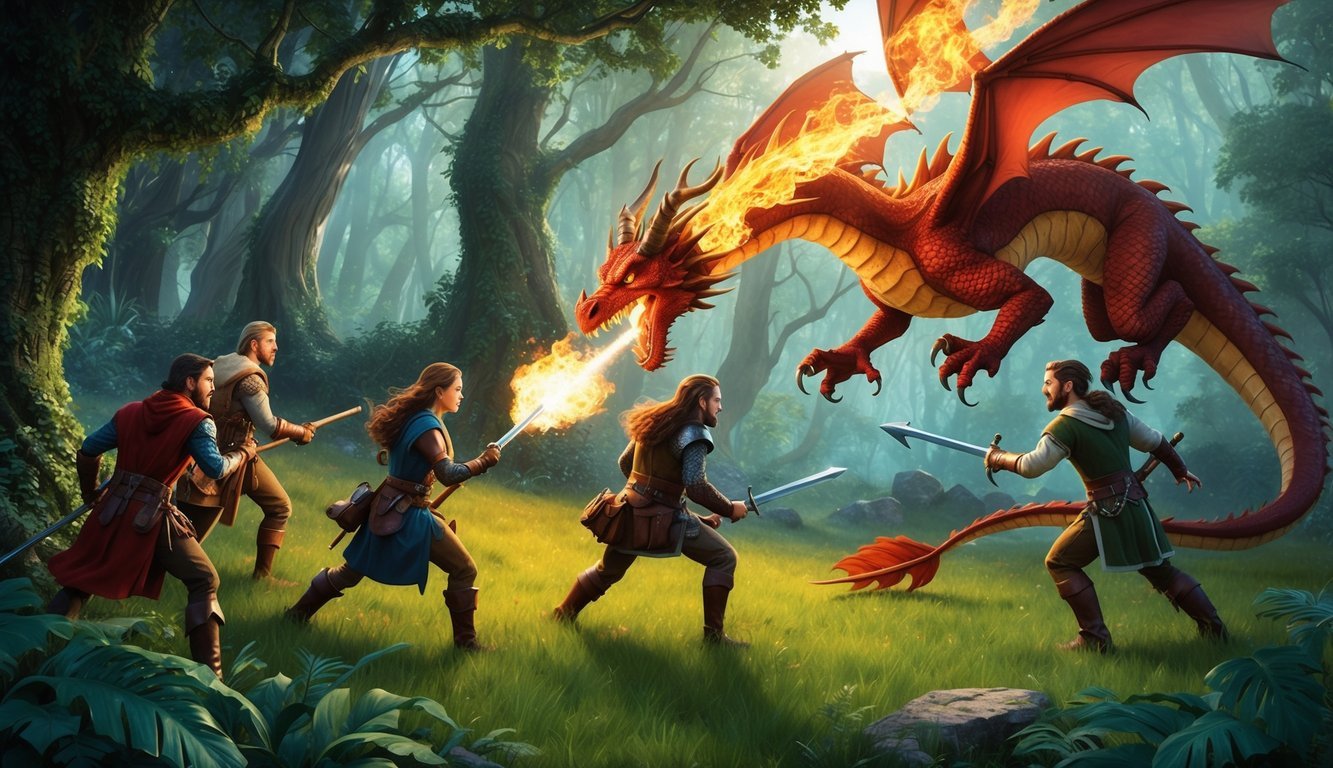Fantasy RPGs transport you to magical realms filled with epic quests, fearsome monsters, and powerful magic.
These games let you become the hero of your own story, crafting a unique character and shaping the fate of entire worlds. From classic titles like Baldur’s Gate to modern masterpieces like Elden Ring, fantasy RPGs offer some of the most immersive and rewarding gaming experiences you can find.
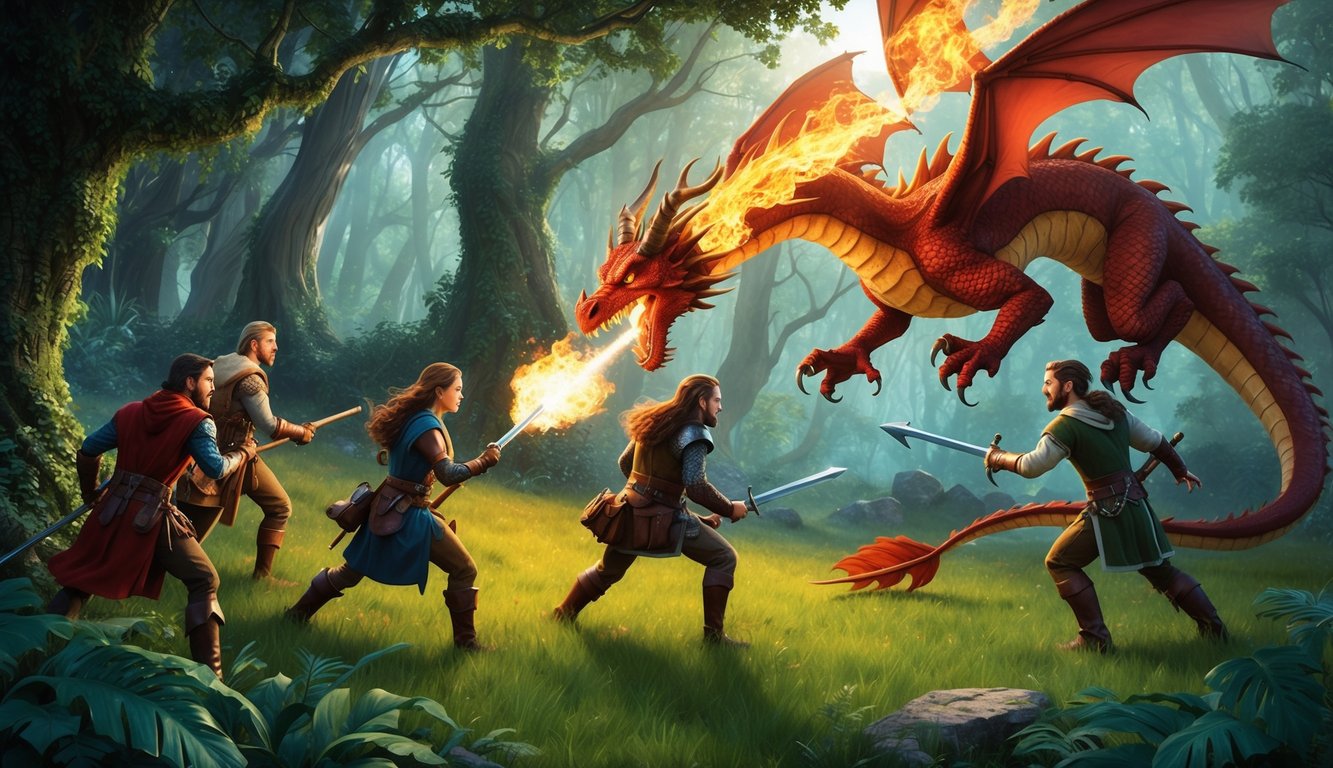
Whether you prefer traditional turn-based combat or action-packed real-time battles, there’s a fantasy RPG out there for you.
You might explore vast open worlds, delve into intricate storytelling, or focus on deep character customization.
Some games stick closely to familiar fantasy tropes, while others put inventive twists on the genre.
With so many great options available, it can be tough to know where to start.
But don’t worry – we’ve got you covered with recommendations for both timeless classics and exciting new releases.
Get ready to lose yourself in fantastical worlds brimming with adventure!
The World of Fantasy RPGs
Fantasy RPGs transport you to magical realms filled with mythical creatures, epic quests, and powerful magic.
These games blend storytelling, character development, and immersive worlds to create unforgettable adventures.
Defining the Fantasy Genre
Fantasy RPGs draw inspiration from mythology, folklore, and classic literature.
You’ll encounter elves, dwarves, dragons, and wizards in richly detailed settings.
Magic plays a central role, allowing you to cast spells and wield enchanted weapons.
The genre often features heroic quests to save the world from dark forces.
You might start as a humble adventurer and grow into a legendary hero.
Character customization lets you shape your avatar’s abilities, appearance, and backstory.
Fantasy RPGs range from turn-based classics to modern action-oriented titles.
Some focus on deep narratives, while others emphasize exploration and combat.
A Tour Through Rivellon and Middle-Earth
Rivellon, the setting of the Divinity series, offers a vibrant world of magic and intrigue.
You’ll explore diverse landscapes, from lush forests to bustling cities, each brimming with quests and secrets.
Middle-Earth, J.R.R. Tolkien’s iconic realm, comes to life in games based on The Lord of the Rings.
You can walk in Frodo’s footsteps, battle orcs in Moria, or defend Helm’s Deep against Saruman’s armies.
These worlds showcase the genre’s potential for immersion.
Detailed lore, memorable characters, and breathtaking vistas create living, breathing universes for you to discover.
High Fantasy vs. Dark Fantasy
High fantasy embraces a more optimistic tone.
You’ll find noble heroes, clear moral choices, and epic battles of good versus evil.
Worlds like Middle-Earth exemplify this style, with its grand quests and moments of triumph.
Dark fantasy takes a grittier approach.
Moral ambiguity reigns, and danger lurks around every corner.
You’ll face tough choices with no clear right answers.
Games in this style often feature more realistic violence and mature themes.
Both subgenres offer unique experiences.
High fantasy delivers epic adventures and feel-good moments.
Dark fantasy challenges you with complex narratives and morally gray characters.
Iconic Fantasy RPG Titles
Fantasy RPGs transport you to magical realms filled with epic quests and unforgettable characters.
These games have shaped the genre and captivated players for decades.
The Witcher 3: Wild Hunt
You’ll find yourself immersed in a dark fantasy world as Geralt of Rivia in The Witcher 3.
This sprawling open-world adventure offers deep storytelling and morally complex choices.
The game’s rich lore and memorable characters bring the Northern Kingdoms to life.
You’ll face terrifying monsters and political intrigue as you unravel the main quest.
Side quests in The Witcher 3 are just as engaging as the main story.
Each feels like a fully realized tale, often with unexpected twists and consequences.
Skyrim and the Elder Scrolls Series
Skyrim lets you forge your own path in a vast fantasy realm.
As the Dragonborn, you’re free to explore snow-capped mountains, ancient ruins, and bustling cities at your own pace.
The game’s flexibility is its strength.
You can be a noble warrior, a stealthy assassin, or a powerful mage – or mix and match as you see fit.
Skyrim’s modding community has kept the game fresh for years.
You’ll find countless user-created quests, items, and even entirely new lands to explore.
A Dive Into Dragon Quest
Dragon Quest brings classic JRPG charm to life with its colorful art style and turn-based combat.
You’ll embark on grand adventures filled with quirky characters and heartwarming stories.
The series is known for its consistency.
Each game offers a standalone tale that’s accessible to newcomers while rewarding longtime fans.
Dragon Quest’s monsters are iconic.
From adorable Slimes to fearsome bosses, you’ll face a menagerie of creative creatures designed by Dragon Ball artist Akira Toriyama.
Game Mechanics Overview
Fantasy RPGs employ intricate systems to simulate epic adventures.
These mechanics govern how you battle fearsome foes, wield arcane powers, and grow your hero from novice to legend.
Understanding Combat Systems
You’ll face off against all manner of monsters in turn-based or real-time battles.
Most games use stats like hit points, attack, and defense to determine outcomes.
Your choices matter – selecting the right weapons, armor, and tactics can turn the tide.
Some systems let you target specific body parts or use terrain to your advantage.
Many RPGs feature party-based combat where you control a group of heroes.
This adds depth as you balance the strengths and weaknesses of different character classes.
The Role of Magic and Sorcery
Spells add flair and strategy to your adventures.
You might hurl fireballs, summon creatures, or heal allies.
Magic systems vary widely between games.
Some use mana points, while others employ cooldowns or limited spell slots.
Certain RPGs tie magic to specific schools or elements.
Learning new spells often involves finding rare tomes or training with masters.
Powerful magic items can grant unique abilities, turning the tide in tough battles.
Loot Systems and Character Progression
Defeating foes and completing quests rewards you with treasure.
This might include gold, gear, or valuable artifacts.
You’ll constantly upgrade your equipment, seeking legendary weapons and armor.
Some games use randomized loot drops to keep things exciting.
Experience points fuel your character’s growth.
As you level up, you’ll gain new abilities and improve your stats.
Many RPGs offer skill trees or class specializations, letting you customize your hero’s path.
Crafting systems in some games allow you to create or enhance gear using gathered materials.
Evolution of RPG Systems
Fantasy RPGs have undergone significant transformations since their inception.
Systems have evolved from dice rolls to complex digital mechanics, reshaping how you interact with magical worlds.
From Tabletop to Digital: RPG History
Tabletop RPGs like Dungeons & Dragons laid the foundation for digital RPGs.
You’d gather with friends, roll dice, and imagine fantastical scenarios.
As computers emerged, early digital RPGs tried to recreate this experience.
Games like Wizardry and Ultima paved the way, translating pen-and-paper mechanics into pixels.
Text-based adventures gave way to graphical interfaces.
You could now see your character and the world around them.
JRPGs like Final Fantasy brought their own flavor, emphasizing storytelling and party-based gameplay.
Western RPGs focused more on player choice and open worlds.
Both styles continue to shape the genre today.
Turn-Based Combat to Real-Time Action
Combat systems have seen dramatic changes.
Early RPGs stuck close to tabletop roots with turn-based battles.
You’d input commands for your entire party, then watch the round unfold.
As technology advanced, real-time combat became possible.
Action RPGs like Diablo let you hack and slash directly.
Many games now blend elements of both styles.
Some titles offer a hybrid approach.
You can pause combat to issue tactical commands, combining strategy with fast-paced action.
This evolution gives you more dynamic and engaging battle experiences.
The Impact of Mods on RPG Evolution
Mods have revolutionized RPGs, extending their lifespan and pushing innovation.
You can now customize games far beyond their original design.
The modding scene has given birth to entirely new games.
Counter-Strike began as a Half-Life mod before becoming a standalone hit.
RPGs have seen similar transformations.
Mods allow you to tweak everything from graphics to gameplay mechanics.
New quests, items, and even total conversions are possible.
This player-driven evolution keeps older RPGs fresh and inspires developers to include more customization options in new releases.
Exploration and Quest Design
Fantasy RPGs thrive on immersive worlds and engaging narratives.
Exploration and quests are the lifeblood of these games, offering players freedom, adventure, and rich storytelling experiences.
Open-World Exploration and Freedom
Open-world exploration is a cornerstone of many beloved fantasy RPGs.
You’re often dropped into vast, intricate landscapes teeming with secrets and wonders.
Games like “The Elder Scrolls” series give you the freedom to wander in any direction, stumbling upon hidden caves, ancient ruins, or bustling towns.
This sense of discovery keeps you engaged for hours.
You might scale a mountain just to see the view or dive into a mysterious lake to find sunken treasure.
The best RPGs reward your curiosity with unique items, lore snippets, or unexpected quests.
Some games even let you shape the world through your exploration.
You could stumble upon a village under attack and choose to defend it, altering the local dynamics.
The Importance of Side Quests
Side quests are the unsung heroes of fantasy RPGs.
They flesh out the world, provide character development, and offer a break from the main storyline.
You’ll often find these optional adventures more memorable than the primary plot.
Good side quests:
- Add depth to NPCs and locations
- Offer unique rewards
- Present moral dilemmas
- Reveal hidden lore
Games like “The Witcher 3” excel at crafting side quests that feel essential to the world.
You might help a village deal with a monster, only to uncover a complex tale of love and betrayal.
Side quests also allow you to level up, gain new skills, and acquire better gear.
This progression feels natural and earned, enhancing your overall experience.
Creating an Immersive Story Experience
The best fantasy RPGs weave exploration and quests into a cohesive, immersive story.
Your actions and discoveries should feel consequential, shaping the narrative and the world around you.
Games like “Dragon Age: Inquisition” tie exploration directly to the main plot.
As you venture into new areas, you uncover clues about the central mystery and gain allies for your cause.
Effective storytelling techniques include:
- Environmental storytelling (ruins, artifacts)
- NPC interactions that change based on your actions
- Choices that affect multiple quests or storylines
You should feel like your exploration matters.
Maybe finding an ancient tome unlocks new dialogue options, or helping a stranger leads to a crucial ally later in the story.
The key is to make every quest, whether main or side, feel like an integral part of your character’s journey.
This creates a rich, interconnected world that keeps you invested from start to finish.
RPG Character Dynamics
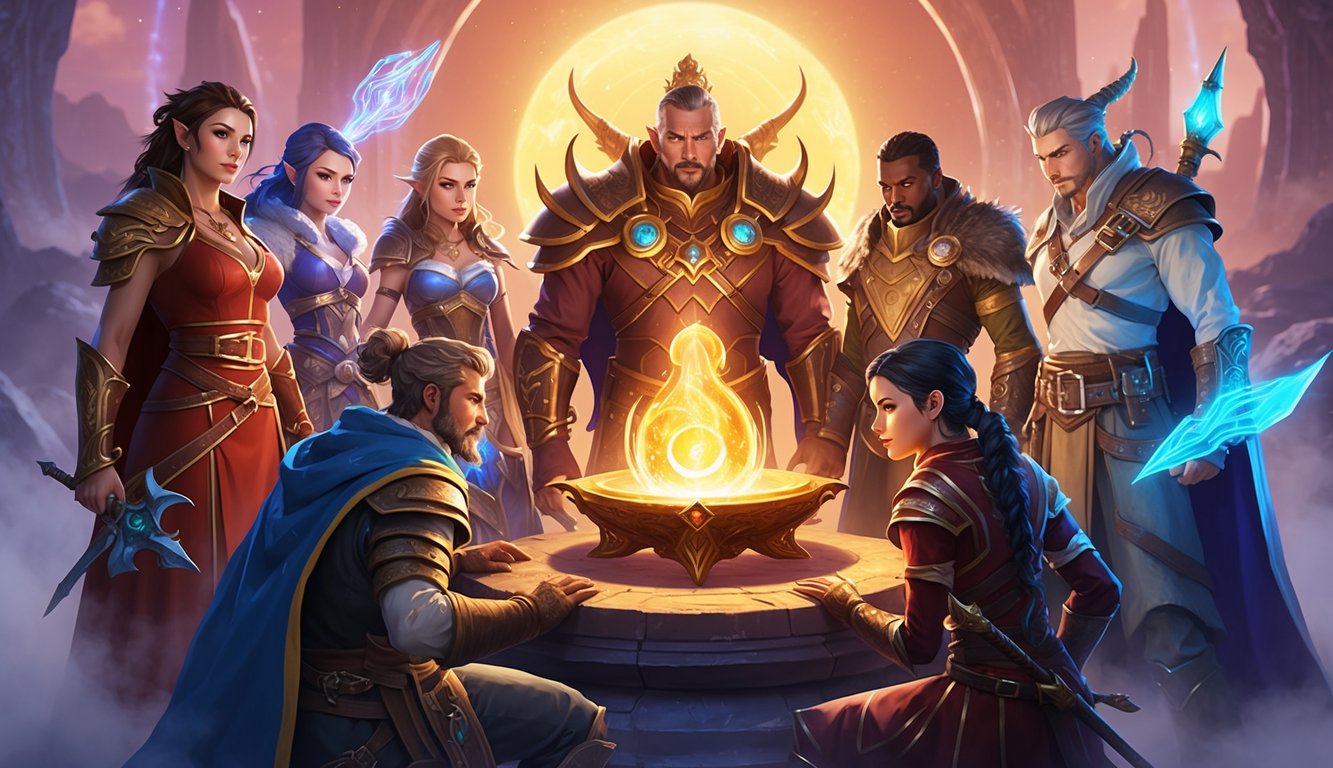
Character dynamics are at the heart of fantasy RPGs.
You’ll encounter a diverse cast of heroes, villains, and mythical creatures that bring these magical worlds to life.
Let’s explore the key elements that make RPG characters so captivating.
Heroes and Anti-Heroes
In fantasy RPGs, you’ll often play as the hero – a brave warrior or gifted mage destined to save the world.
But not all protagonists fit the classic hero mold.
Anti-heroes have become increasingly popular, letting you take on morally ambiguous roles.
You might play a roguish thief or a brooding outcast seeking redemption.
Some games even let you choose between heroic and villainous paths.
Your choices shape your character’s development and the story’s outcome.
Heroes frequently start as underdogs who grow in power and skill.
Meanwhile, anti-heroes may already be formidable but struggle with inner demons or a dark past.
Elves, Knights, and Dragons, Oh My!
Fantasy RPGs are filled with iconic character types drawn from myth and legend.
You’ll encounter noble elves, chivalrous knights, and fearsome dragons.
Elves are often portrayed as graceful archers or wise mages with a deep connection to nature.
Knights embody ideals of honor and courage, clad in shining armor.
Dragons serve as both allies and adversaries.
You might befriend a dragon companion or face one as an epic boss battle.
Other common fantasy races include dwarves, orcs, and otherworldly creatures.
Each brings unique abilities and cultural backgrounds to explore.
Mixing these classic archetypes with original creations keeps RPG worlds fresh and exciting.
Character Creation Tools and Techniques
Modern RPGs offer robust character creation systems.
You can fine-tune your hero’s appearance, abilities, and backstory.
Visual customization lets you adjust facial features, hairstyles, and even scars or tattoos.
Some games provide sliders for precise control over body proportions.
Skill trees and attribute points allow you to specialize in combat styles or magical disciplines.
You might focus on swordsmanship or master the elements.
Backstory generators help flesh out your character’s history.
You can select key life events or traits that influence dialogue options and quest outcomes.
Many games also include personality systems.
Your choices in conversations and quests shape your character’s moral alignment and relationships with others.
RPG Subgenres and Innovations
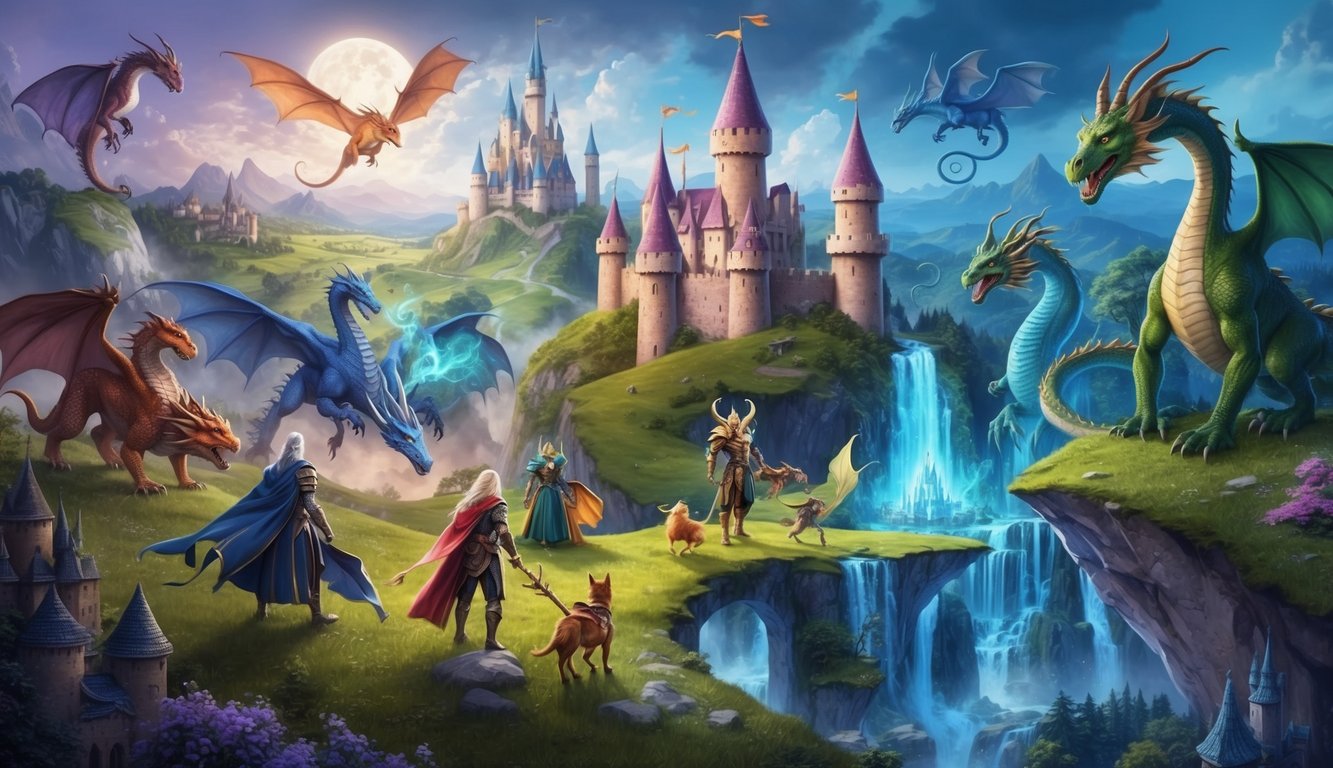
Fantasy RPGs have evolved into distinct subgenres over the years, each with its own unique gameplay mechanics and narrative styles.
These innovations have expanded the possibilities of role-playing games and catered to diverse player preferences.
Understanding CRPG, ARPG, and JRPG
CRPGs (Computer Role-Playing Games) often focus on deep character customization and turn-based combat.
You’ll find intricate stories and tactical gameplay in titles like Baldur’s Gate.
ARPGs (Action Role-Playing Games) blend RPG elements with real-time combat.
Diablo is a prime example, offering fast-paced gameplay and loot-driven progression.
JRPGs (Japanese Role-Playing Games) typically feature preset characters and linear storylines.
Final Fantasy revolutionized the genre with its epic narratives and innovative battle systems.
Each subgenre offers a unique experience, allowing you to choose between strategic depth, action-packed adventures, or story-rich journeys.
MMORPGs and Social Gaming
MMORPGs (Massively Multiplayer Online Role-Playing Games) bring thousands of players together in persistent virtual worlds.
World of Warcraft popularized this subgenre, creating vast landscapes for you to explore with friends.
These games emphasize social interaction, cooperative gameplay, and player-driven economies.
You can join guilds, participate in large-scale raids, or engage in player-vs-player combat.
Recent innovations include dynamic events and cross-platform play, allowing you to adventure with others regardless of your gaming device.
Indie Innovations in RPGs
Indie developers have pushed the boundaries of RPGs with fresh ideas and experimental gameplay.
Undertale subverted expectations by allowing you to resolve conflicts without violence.
Indie RPGs often feature unique art styles and unconventional narratives.
Stardew Valley combined farming simulation with RPG elements, creating a relaxing yet engaging experience.
These games frequently challenge traditional RPG norms, offering you novel ways to interact with characters and progress through stories.
They prove that innovation doesn’t always require big budgets.
Noteworthy Developers and Studios
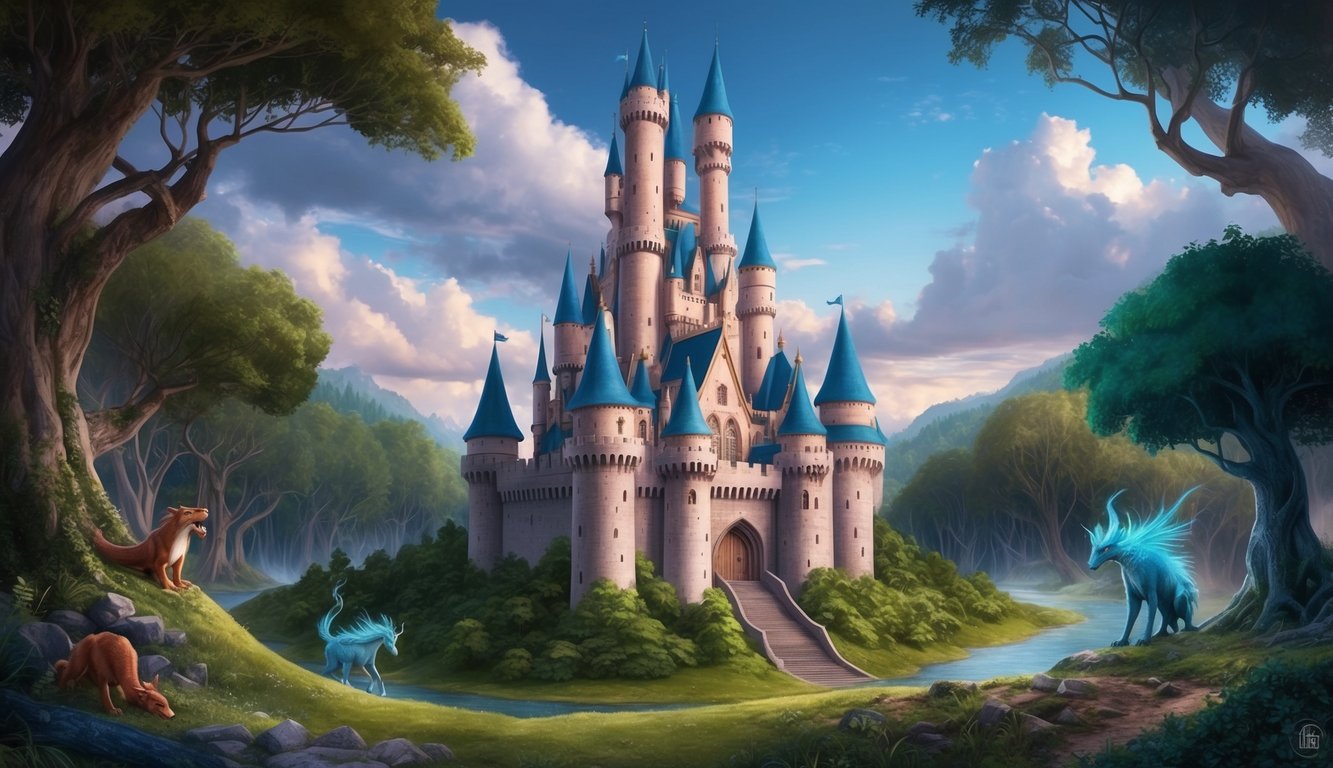
Several game studios have made their mark on the fantasy RPG genre with distinctive approaches and acclaimed titles.
These developers have shaped player expectations and pushed creative boundaries in unique ways.
The Mastery of Square Enix
You’ve probably encountered Square Enix’s work if you’re a fan of fantasy RPGs.
They’ve crafted some of the most iconic series in the genre, like Final Fantasy and Dragon Quest.
Their games often feature stunning visuals, complex narratives, and innovative battle systems.
Square Enix has a knack for blending traditional fantasy elements with futuristic themes.
You’ll find yourself immersed in worlds where magic and technology coexist.
Their character designs are instantly recognizable, often created by renowned artists like Tetsuya Nomura.
The studio’s commitment to quality storytelling and gameplay refinement has earned them a loyal fanbase.
When you pick up a Square Enix RPG, you can expect a polished experience with high production values.
Obsidian Entertainment’s Craft
Obsidian Entertainment has made a name for itself with deep, choice-driven RPGs.
You’ll love their games if you enjoy complex narratives and meaningful player agency.
Titles like Pillars of Eternity showcase their talent for creating rich, detailed worlds.
Their approach focuses on giving you control over your character’s destiny.
You’ll make decisions that significantly impact the story and your relationships with other characters.
Obsidian’s writing team excels at creating morally ambiguous scenarios that challenge your beliefs.
The studio’s games often feature isometric perspectives and party-based gameplay, harkening back to classic RPGs.
You’ll appreciate the depth of character customization and the intricate quest design in their titles.
From Software’s Unique Approach
From Software has revolutionized fantasy RPGs with their challenging, atmospheric games.
You’ve likely heard of Dark Souls, Bloodborne, or Elden Ring – titles that have redefined player expectations for difficulty and world design.
These games throw you into mysterious, often bleak worlds with minimal hand-holding.
You’ll piece together the lore through environmental storytelling and cryptic item descriptions.
The combat is punishing but fair, rewarding your patience and skill.
From Software’s approach emphasizes exploration and discovery.
You’ll find yourself venturing into hauntingly beautiful landscapes, facing formidable foes, and uncovering secrets.
Their games have spawned a new subgenre, inspiring many imitators and earning a dedicated fanbase.
Challenges and Strategies in RPGs
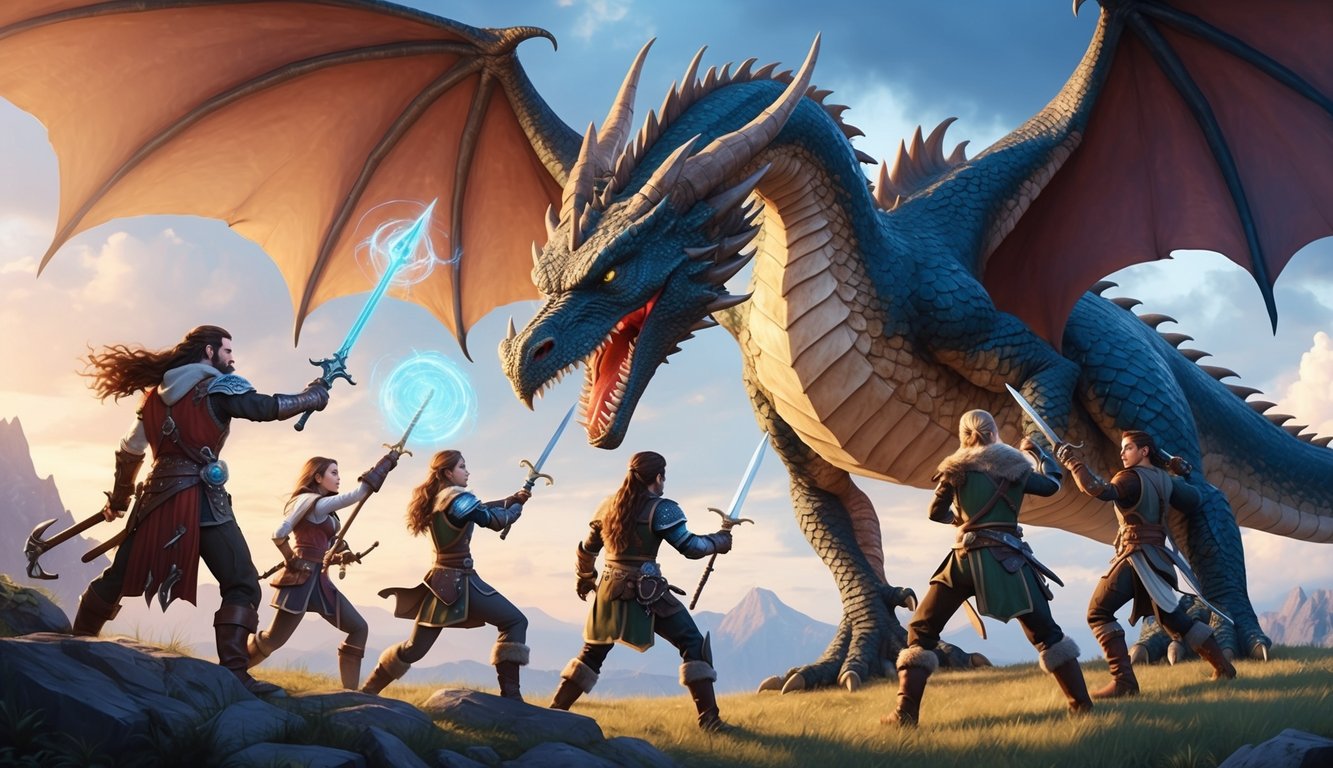
Fantasy RPGs are packed with thrilling challenges that’ll test your skills and keep you on your toes.
From intense battles to sneaky maneuvers, you’ll need to master various tactics to overcome obstacles and emerge victorious.
Mastering Combat Mechanics
Combat is the heart of many RPGs, and mastering it is crucial for your success.
You’ll need to learn the ins and outs of your character’s abilities and how to use them effectively.
Timing is everything in fights.
Practice dodging, parrying, and landing critical hits to gain the upper hand.
Don’t forget to experiment with different weapon combinations and spells to find what works best for you.
Positioning is key too.
Keep an eye on the battlefield and use terrain to your advantage.
Flanking enemies or finding cover can turn the tide of battle in your favor.
Puzzling Out Stealth and Sneak Attacks
Stealth adds a whole new layer of excitement to RPGs.
It’s not just about avoiding detection; it’s about using the shadows to your advantage.
Learn to read enemy patrol patterns and time your movements carefully.
Use distractions to create openings and slip past guards unnoticed.
Sneak attacks can be game-changers.
Master the art of silent takedowns and you’ll be able to thin out enemy ranks before they even know you’re there.
Remember, patience is your best friend when going stealthy.
Take your time, observe, and strike when the moment is right.
The Grind: Exploring Grinding and Farming
Grinding and farming are often necessary evils in RPGs.
They can be tedious, but they’re also great ways to power up your character and stock up on resources.
Look for efficient grinding spots where enemies respawn quickly.
This can help you level up faster and gather valuable loot.
Mix things up to avoid burnout.
Try different areas or take on side quests while grinding to keep things interesting.
Don’t forget about crafting.
Farming materials can help you create powerful gear, giving you an edge in tough battles.
The RPG Community
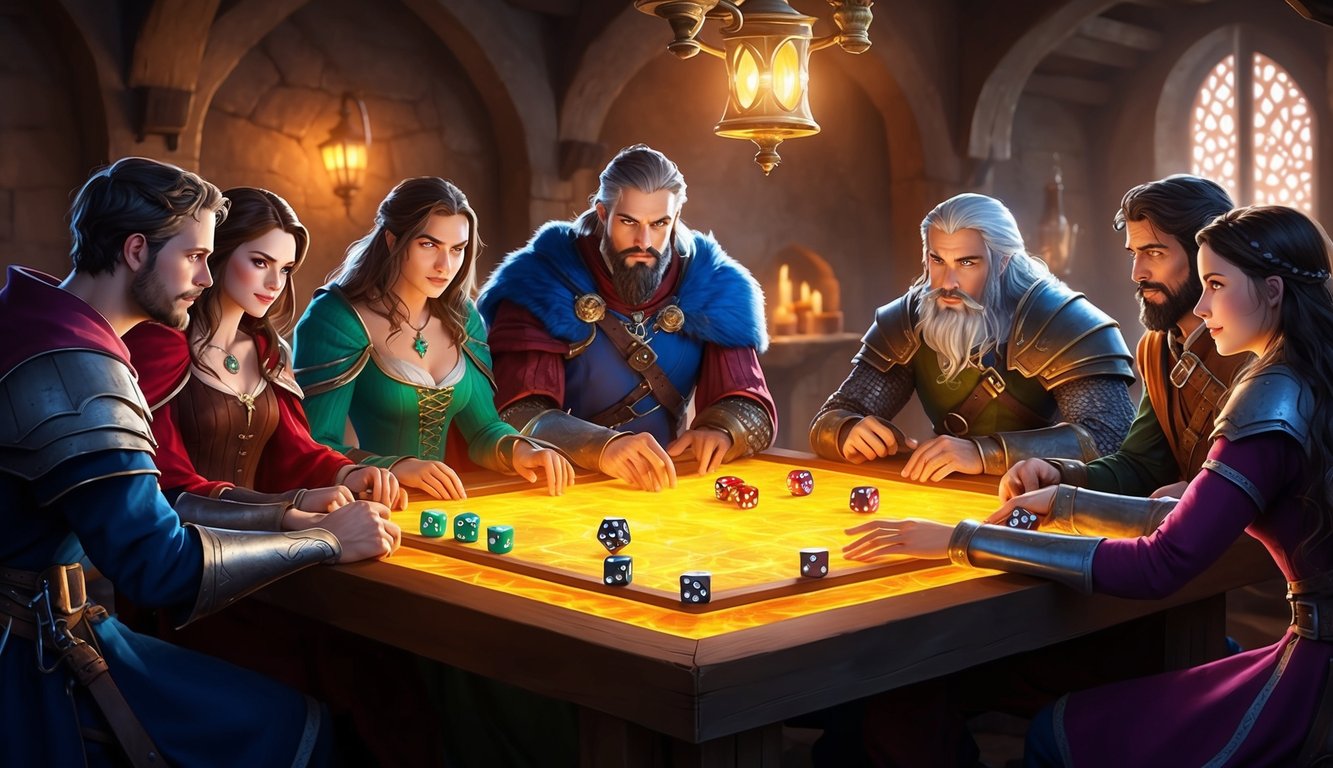
Fantasy RPGs thrive on the vibrant communities that form around them.
Players come together to share experiences, create content, and engage in epic adventures.
These communities foster creativity, competition, and camaraderie.
The Modding Scene
The modding scene breathes new life into RPGs long after their release.
You’ll find countless mods for popular games like Skyrim and The Witcher 3.
These fan-made additions range from simple texture upgrades to entirely new quests and characters.
Want to turn dragons into Thomas the Tank Engine? There’s a mod for that.
Fancy playing as a vampire lord? Modders have you covered.
The creativity of the modding community knows no bounds.
Many developers embrace this passion, providing tools and support for modders.
This collaboration often leads to incredible innovations that enhance your gaming experience.
PvP, Guilds, and Community Events
Player-versus-player (PvP) content keeps the competitive spirit alive in many RPGs.
You’ll find intense battlegrounds in games like Guild Wars 2 and New World.
These arenas test your skills against other players, offering unique challenges and rewards.
Guilds form the backbone of many RPG communities.
You can join like-minded players to tackle tough raids, dominate PvP, or simply chat and make friends.
Guild activities often become the highlight of your gaming sessions.
Community events bring players together in exciting ways.
You might participate in seasonal festivals, player-run tournaments, or charity livestreams.
These events showcase the best aspects of RPG communities.
Role-Playing and Social Interactions
Role-playing adds depth to your RPG experience.
You can join dedicated RP servers or groups to immerse yourself in character-driven stories.
These communities often create rich narratives that extend far beyond the game’s original plot.
Social interactions are at the heart of RPG communities.
You’ll find active forums, Discord servers, and subreddits for your favorite games.
These platforms let you share tips, show off achievements, and discuss lore with fellow enthusiasts.
Many RPGs now include social features directly in-game.
You can easily team up with strangers for quests or join impromptu dance parties in town squares.
These interactions make the game world feel alive and dynamic.

